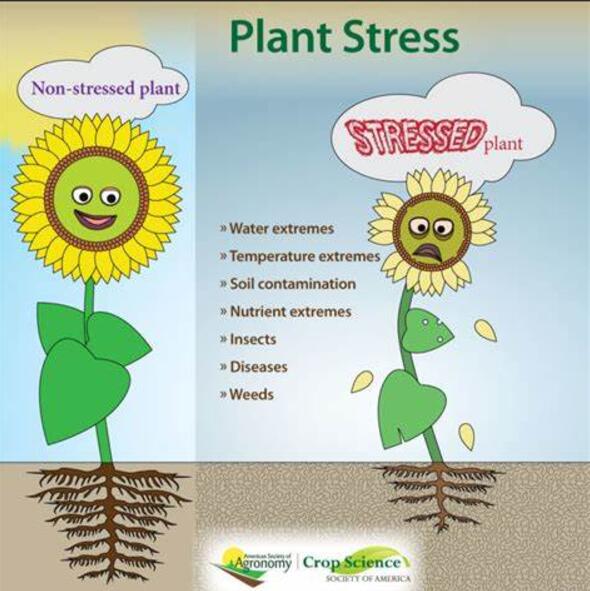通过铁纳米颗粒增强作物对水分胁迫的抗逆性:应用和意义的重要回顾
IF 6.8
Q1 PLANT SCIENCES
引用次数: 0
摘要
在非生物胁迫中,水胁迫是限制全球农业生产力的一个关键因素,它通过许多生物化学和生理破坏来降低作物产量。纳米材料在商业产品中的应用正在迅速扩大,在农业和植物修复方面有重要应用。当前纳米技术的进步已经引入了铁纳米颗粒(Fe-NPs)作为一种有希望的方法来提高作物对逆境条件的抗逆性。铁(Fe)在光合作用、酶激活、叶绿素合成和氧化胁迫管理中起着至关重要的作用,是植物应对水分胁迫的关键。由于高表面积、小尺寸和可控的反应性,Fe- nps比传统的铁源表现出非凡的优势,即提高生物利用度和营养吸收。本综述探讨了Fe-NP通过激活多种有益机制,包括改善抗氧化防御、渗透调节和调节与植物激素相关的胁迫,减轻作物水分胁迫不利影响的潜力。特别是Fe-NPs提高了水分利用效率(WUE)和根系发育,促进了逆境条件下水分和养分的吸收。此外,Fe-NPs还有助于抗氧化酶的调节,从而减少活性氧(ROS)的积累,从而减少氧化损伤,维持植物在有限水分条件下的代谢活动。然而,铁np在农业中的使用会带来潜在的健康和环境风险,包括水和土壤污染、土壤微生物改变和可食用作物中的残留,这些都需要仔细考虑。此外,Fe-NP的有效性可能取决于纳米颗粒(NPs)的大小、浓度、施用方法和作物类型等因素。本文最后讨论了潜在的研究途径,强调了可持续应用方法、优化Fe-NP配方和全面的环境影响评价的必要性。Fe-NPs是创造下一代纳米农业技术的一个有希望的元素,这些技术旨在提高作物对水分胁迫的抵抗力,最终可能在面临气候变化的情况下改善粮食安全。本文章由计算机程序翻译,如有差异,请以英文原文为准。
Enhancing crop resilience to water stress through iron nanoparticles: A critical review of applications and implications
Among the abiotic stresses, water stress is a key factor that limits agricultural productivity worldwide by reducing crop yield through numerous biochemical and physiological disruptions. The use of nanomaterials in commercially available products is rapidly expanding, with significant applications in agriculture and phytoremediation. Current advancements in nanotechnology have introduced iron nanoparticles (Fe-NPs) as a promising approach to enhance crop resilience against stress conditions. Iron (Fe) plays a critical role in photosynthesis, enzyme activation, chlorophyll synthesis, and oxidative stress management, which are pivotal to plant response against water stress. Due to high surface area, small size, and controlled reactivity, Fe-NPs exhibit exceptional advantages over traditional Fe sources, viz., improved bioavailability and nutrient uptake. The current review explores Fe-NP's potential to mitigate the adverse effects of water stress in crop plants by activating various beneficial mechanisms, including improvement in antioxidant defence, osmotic adjustment, and modulating stress related to phytohormones. Particularly, Fe-NPs improve water use efficiency (WUE) and root development, facilitating water and nutrient uptake under stress conditions. Moreover, Fe-NPs assist in antioxidant enzyme regulation, which reduces the accumulation of reactive oxygen species (ROS), thereby reducing oxidative damage and sustaining the metabolic activities of plants under limited water availability. However, Fe-NP use in agriculture poses potential health and environmental risks, including water and soil contamination, soil microbial alteration, and residues in edible crop plants, which require careful consideration.
Furthermore, Fe-NP effectiveness may vary depending on factors, viz., size of nanoparticles (NPs), concentration, method of application, and crop type. The paper concludes by discussing potential research avenues, highlighting the necessity of sustainable application methods, optimal Fe-NP formulations, and thorough environmental effect evaluations. Fe-NPs are a promising element in creating next-generation, nano-enabled farming techniques meant to increase crop resistance to water stress, which could ultimately improve food security in the face of a changing climate.
求助全文
通过发布文献求助,成功后即可免费获取论文全文。
去求助
来源期刊

Plant Stress
PLANT SCIENCES-
CiteScore
5.20
自引率
8.00%
发文量
76
审稿时长
63 days
期刊介绍:
The journal Plant Stress deals with plant (or other photoautotrophs, such as algae, cyanobacteria and lichens) responses to abiotic and biotic stress factors that can result in limited growth and productivity. Such responses can be analyzed and described at a physiological, biochemical and molecular level. Experimental approaches/technologies aiming to improve growth and productivity with a potential for downstream validation under stress conditions will also be considered. Both fundamental and applied research manuscripts are welcome, provided that clear mechanistic hypotheses are made and descriptive approaches are avoided. In addition, high-quality review articles will also be considered, provided they follow a critical approach and stimulate thought for future research avenues.
Plant Stress welcomes high-quality manuscripts related (but not limited) to interactions between plants and:
Lack of water (drought) and excess (flooding),
Salinity stress,
Elevated temperature and/or low temperature (chilling and freezing),
Hypoxia and/or anoxia,
Mineral nutrient excess and/or deficiency,
Heavy metals and/or metalloids,
Plant priming (chemical, biological, physiological, nanomaterial, biostimulant) approaches for improved stress protection,
Viral, phytoplasma, bacterial and fungal plant-pathogen interactions.
The journal welcomes basic and applied research articles, as well as review articles and short communications. All submitted manuscripts will be subject to a thorough peer-reviewing process.
 求助内容:
求助内容: 应助结果提醒方式:
应助结果提醒方式:


